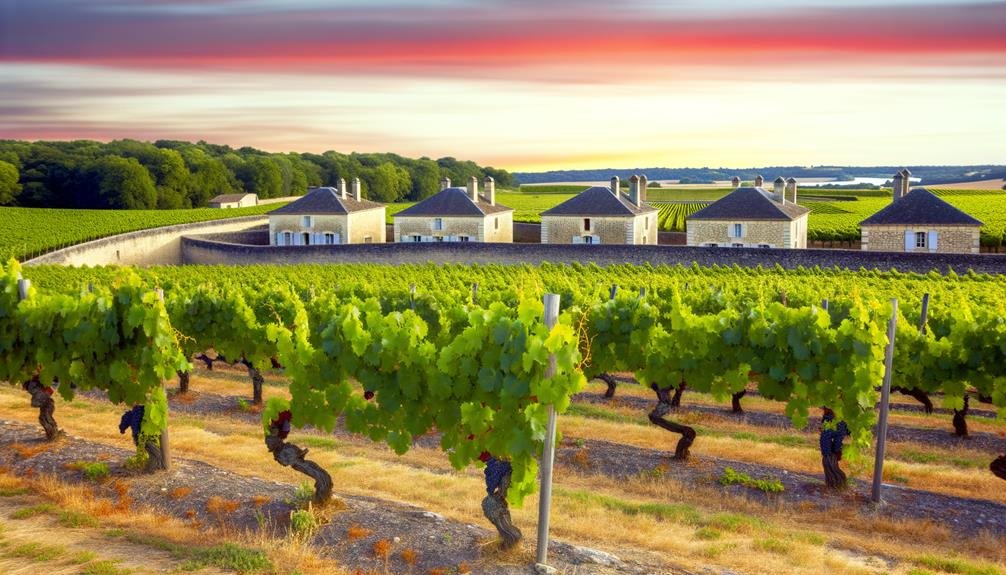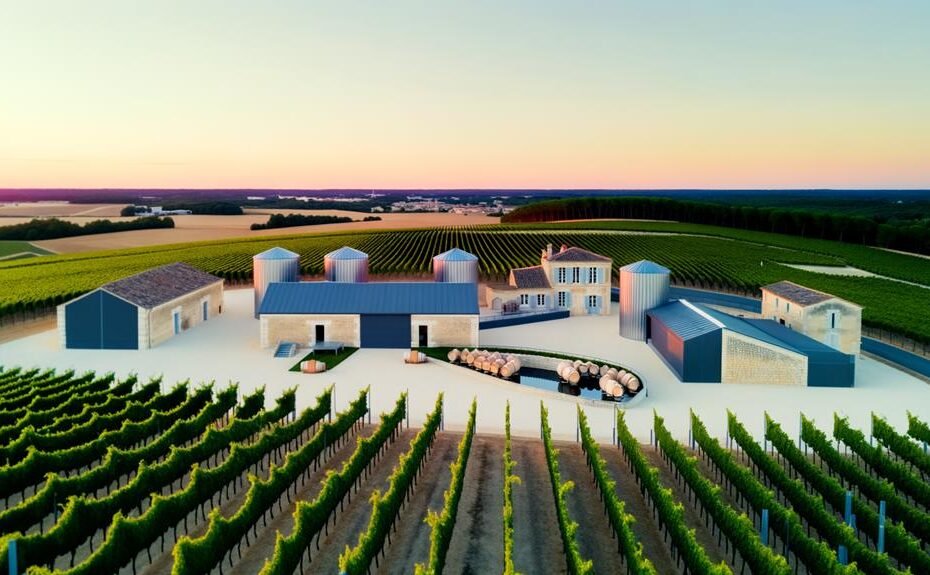Bordeaux wineries are currently undergoing a fascinating transformation as they blend tradition with innovation, reshaping the renowned wine region.
One notable example is Château Cazebonne, which is bringing back once-forbidden grape varieties like Saint-Macaire and Castets, alongside a commitment to biodynamic farming methods.
Another standout is Château de Reignac, which is revolutionizing access to top-quality Bordeaux Superieur wines through direct online sales and active social media presence.
By finding a delicate equilibrium between honoring heritage and embracing modern practices, these wineries are redefining the Bordeaux wine experience.
What exciting developments lie ahead in this evolving landscape?
Forbidden Bordeaux Grapes

Château Cazebonne is making a daring move by growing once-forbidden Bordeaux grape varieties like Saint-Macaire and Castets. This decision by Jean-Baptiste Duquesne aims to revive Bordeaux's traditional winemaking practices while embracing biodynamic farming methods.
By avoiding chemicals and focusing on natural cultivation, the vineyard is honoring the region's heritage and offering a new tasting experience for wine lovers. Bringing back these forgotten grapes shows a dedication to innovation in the wine industry, allowing consumers to explore Bordeaux's unique history through their glasses.
Château Cazebonne's efforts highlight the ever-changing landscape of winemaking, blending the old with the new in a refreshing way.
Bordeaux Wine Accessibility
Bordeaux wines have been traditionally seen as luxurious and exclusive, but recent innovations are making them more accessible. Château de Reignac and other wineries are leading this change by offering Bordeaux Superieur wines that match Grand Crus in quality without the high price tag.
Through direct online sales, these châteaux are reaching a global audience, allowing more people to enjoy premium Bordeaux wines. Utilizing social media, like their mascot Reignyx, they are creating a more engaging and approachable experience for wine enthusiasts.
These efforts are making Bordeaux wines more inclusive and appealing to a wider range of consumers, breaking down traditional barriers in the wine world.
Transforming Wine Experiences

In Bordeaux, forward-thinking wineries are reshaping the wine-tasting experience by combining historical allure with modern conveniences. One prime example is Cloître des Cordeliers, which repurposes a 14th-century cloister into a versatile venue. Visitors can savor wine tastings surrounded by ancient remains, with plans in the works for a music stage and bar to enhance the lively ambiance.
Château Cazebonne is another trailblazer, reintroducing forgotten grape varieties and embracing biodynamic practices to put a fresh spin on Bordeaux's traditional winemaking heritage. In a similar vein, Château de Reignac adopts a savvy approach by leveraging social media interaction and direct online sales to ensure that their premium wines are easily accessible.
These wineries are not just preserving the past; they are enriching it, offering immersive experiences that cater to modern preferences while paying homage to the region's rich history. This harmonious blend of old and new sets a compelling example for the future of the winemaking industry.
Conclusion
Bordeaux wineries are embracing both tradition and innovation, bringing new life to the region's viticulture. By reintroducing once-forbidden grape varieties such as Saint-Macaire and Castets, and practicing biodynamic farming methods at Château Cazebonne, these wineries are paying homage to Bordeaux's historical roots.
Additionally, Château de Reignac is making waves with its Bordeaux Superieur wines, which are now on par with Grand Crus. By offering direct online sales and maintaining a strong presence on social media, they are making these exceptional wines more accessible to a wider audience.
These progressive approaches are not only reshaping the wine-tasting experience but also blending modern preferences with a deep appreciation for Bordeaux's prestigious past.
